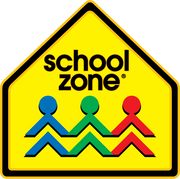Math can be a lot of fun, especially for kindergarteners. Using math games at an early age helps children love numbers and solving problems. At School Zone, we believe learning should be fun and effective. That's why we've put together a list of 10 fun math games for kindergarten kids that you can play at home or in the classroom.
Counting Games
Counting is one of the first math concepts that children learn. These games help children learn numbers and get better at counting:
- Number Hunt: Hide numbers around the house or classroom for your child to find. Give them clues to help find them. When they find a number, ask them to count objects that match it.
- Counting Songs: Sing counting songs like "Five Little Ducks" or "Ten in the Bed." This makes learning numbers fun and memorable.
- Snack Math: Use snacks like crackers or fruit pieces for counting practice. Ask your child to count them before eating.
Shape and Pattern Games
Learning shapes and patterns is important in early math. These games help children recognize shapes and learn patterns:
- Shape Sorter: Use a shape sorter toy or cut shapes from paper. Ask your child to sort them by shape and color.
- Pattern Making: Make simple patterns with blocks or beads and ask your child to continue them. For example, red-blue-red-blue or square-circle-square-circle patterns.
- Shape Hunt: Go on a shape hunt in your house or classroom. Ask your child to find objects that match specific shapes, like circles, squares, and triangles.
DIY Math Games at Home
Making DIY math games at home is a great way to make learning math fun and hands-on for kindergarten-aged kids. Here are some easy and effective DIY math games to try:
- Number Matching: Create a set of cards with numbers and another set with corresponding pictures (e.g., three apples, four stars). Have your child match the number cards with the picture cards.
- Counting Jars: Fill several jars with different quantities of small objects (e.g., buttons, beans). Ask your child to count the objects in each jar and place a label with the correct number on each jar.
- Math Bingo: Create bingo cards with numbers and use small objects (e.g., beans, coins) as markers. Call out math problems (e.g., 2+2, 3-1), and have your child place a marker on the correct answer on their bingo card.
- Hopscotch Math: Draw a hopscotch grid with numbers on the ground. Call out a math problem, and have your child hop to the square with the correct answer.
These DIY math games are easy to set up and can be a fun way to reinforce math skills at home. They provide a hands-on learning experience that can help children better understand and enjoy math.
Outdoor Math Activities
Getting outside and moving around can make learning math even more enjoyable for kindergartners. Here are some outdoor math activities that combine physical activity with learning:
- Number Hunt: Hide numbers around your yard or a local park and have your child find them. Once they find a number, ask them to perform a simple math task, like counting objects or adding numbers together.
- Nature Counting: Take a nature walk and collect items like leaves, rocks, or flowers. Once you have a collection, use them to practice counting, sorting, and simple addition or subtraction.
These outdoor activities not only help children practice math but also encourage them to enjoy the great outdoors and stay active.
Benefits of Math Games for Kindergartners
Math games are more than just a fun activity; they offer numerous benefits for young learners:
- Improved Problem-Solving Skills: Math games encourage kids to think critically and solve problems, which is a valuable skill in all areas of life.
- Enhanced Memory: Many math games require children to remember numbers and patterns, helping to improve their memory.
- Increased Engagement: Fun math games keep kids engaged and interested in learning, making them more likely to retain information.
- Boosted Confidence: Successfully completing math games can boost a child's confidence in their math abilities, encouraging them to tackle more challenging tasks.
- Interactive Learning: Games provide interactive learning experiences that are often more effective than traditional methods.
By incorporating math games into your child's routine, you can help them develop a love for math at an early age. For more educational resources and products, visit the School Zone Website and explore our Kindergarten Collection, Big Kindergarten Workbook, and Kindergarten Full Learning Program.











